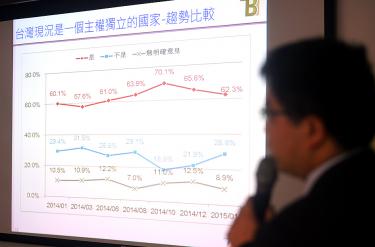A poll conducted by the Taiwan Braintrust shows that nearly 90 percent of the population would identify themselves as “Taiwanese” rather than “Chinese” if they were to choose between the two — and the percentage is even higher among those aged from 20 to 40.
With 1,079 valid samples from 20 cities and counties, the results show that if given the option of being “Taiwanese” or “Chinese,” 89.5 percent of respondents said they would identify themselves as Taiwanese, while just 6 percent said they consider themselves Chinese.
Notably, the percentage of people considering themselves Taiwanese rather than Chinese was larger for younger generations.
Among those aged 70 or older, 76.2 percent said they consider themselves Taiwanese rather than Chinese, while 8.8 percent said they think of themselves as Chinese.
However, for people between 30 and 39 years of age, 93 percent identified themselves as Taiwanese, while 3.2 percent said they are Chinese, and for people from 20 to 29 years old, 92.5 percent identify themselves as Taiwanese, while just 2.4 percent said they are Chinese.
As for the nation’s future, 31.2 percent of respondents said they support independence for Taiwan, while 56.2 percent would prefer to maintain the “status quo” and 7.9 percent support unification with China.
However, when given “independence” and “unification” as the only options, 68.9 percent said they would support independence, while 17.1 percent would support unification with China.
Support for independence is also higher among younger generations, with 79.1 percent of people from 20 to 29 years of age supporting independence, while 12.7 percent support unification with China.
The poll also asked respondents about their impressions of domestic political parties and leaders.
Among the Democratic Progressive Party (DPP), the Chinese Nationalist Party (KMT), the Taiwan Solidarity Union and the People First Party, 33.9 percent of respondents said they prefer the DPP, while 20.5 percent said they support the KMT.
As for the parties’ leaders, 65 percent of respondents said they are satisfied with DPP Chairperson Tsai Ing-wen’s (蔡英文) performance, while 20.8 percent said they are not satisfied with her performance.
KMT Chairman and New Taipei City Mayor Eric Chu’s (朱立倫) support was a little behind, with 46.7 percent saying they are satisfied with his performance, while 27.1 percent are not.
At a press conference to release the results, former presidential adviser Koo Kwang-ming (辜寬敏) criticized Tsai, saying she is unable to solve most of the nation’s problems, including issues of cross-strait relations, while Tainan Mayor William Lai (賴清德) could work things out.
“Our objective is not to get someone elected president; we need a president who can lead Taiwan and solve all the problems,” he said.
Source: Taipei Times - 2015/02/05





















